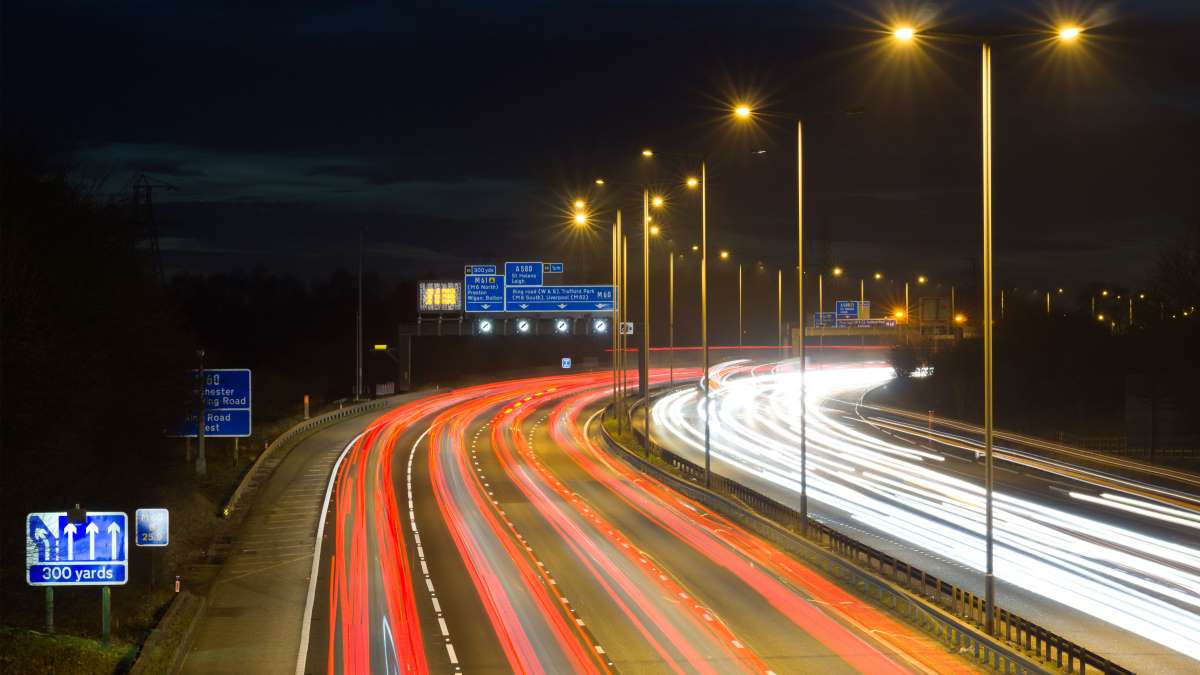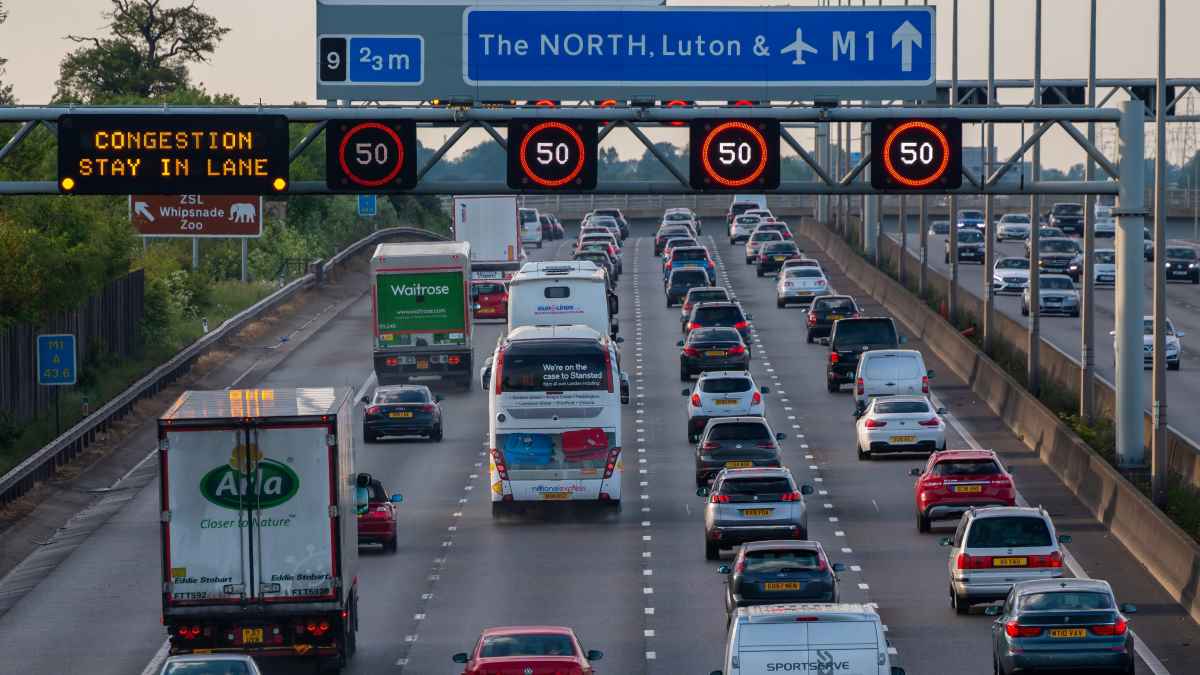Local authorities and national bodies alike are working toward solutions to combat carbon emissions on the UK’s roads and improve the sustainable transport infrastructure

On any given Monday morning in Manchester, traffic builds on the roads heading into the city and cars grind to a halt along Princess Parkway. A similar scene plays out each morning as commuters head into the city centre at the beginning of the working day.
Road travel accounts for over one-third of all carbon emissions in Manchester and it’s a similar story across the country.
In 2019, road transport accounted for 27% of all carbon emissions and at COP26 in November, countries agreed that decarbonising the transport sector is vital if the planet is to achieve net zero by 2050.
For Manchester, a new vision of this future is quickly becoming a reality. The city’s Metrolink light rail network, the largest of its kind in the country, runs on 100% renewable energy, and plans are afoot to electrify the region’s buses. Simon Warburton, transport strategy director at Transport for Greater Manchester (TfGM), says it’s the tip of the iceberg.
”We plan to fully electrify Greater Manchester’s bus fleet as part of our plan to deliver a carbon neutral transport network and to drive out the pollution of diesel buses that is most heavily concentrated in our town and city centre areas,” he says. The region’s bus fleet will be 50% electric by 2027 and 100% electric within a decade, a move that would singlehandedly reduce carbon emissions by 1.1m tonnes. The Greater Manchester Ring and Ride fleet will also transition to zero emission technology by 2027.
The electrification of the UK’s transport sector is essential in the race to decarbonise. In four years, over 100 multinationals have signed up to the EV100 initiative. Businesses that join must make a public commitment to switch their fleet to electric vehicles and/or fund charging points for workers and/or customers. EV100 companies have collectively agreed to switch more than five million vehicles by the end of the decade.
National Highways, the government-owned company that operates, maintains and improves motorways and major A roads across England, has also been swift to act on decarbonisation. By 2030, it wants corporate emissions from its vehicle fleet, offices and onsite lighting to reach net zero. Ten years later, construction and maintenance emissions must also hit that target, with user emissions following by 2050.
Stephen Elderkin, National Highways’ director of environmental sustainability, explains how the company will slash its corporate emissions. “LED lighting will be rolled out across the network, while three million trees will be planted to offset carbon emissions,” he says. “Our fleet of cars will be electric and energy efficient buildings will be used to house staff and vehicles.”
Reducing emissions during the construction and maintenance of roads presents another challenge. Infrastructure companies, including National Highways and their suppliers, will have to implement PAS 2080 during every project, a global standard for managing and reducing infrastructure carbon. The framework looks at the whole value chain and aims to reduce carbon emissions and cost through more intelligent design, construction and use.
National Highways is currently running a £1bn project in Essex to widen 25km of the A12. PAS 2080 was at the forefront of their planning for the work. “Our supplier has made various environmental commitments in their bid to deliver the scheme with us,” says Elderkin. “That includes a 30% reduction in carbon emissions throughout the construction process.”
We know that the appetite for cycling and walking is there and we intend to build on that enthusiasm with our carbon neutral transport ambitions
Work is also under way to ensure that materials used during construction projects produce minimal emissions. “Working with our suppliers and other major clients, we need to set out a roadmap and an expectation of the quality of materials that we expect and which materials are going to reduce the impact on the environment,” adds Elderkin. “We need to look at the cement, asphalt and steel that we use and make sure they aren’t adding to emissions.”
Katherine Bright, transport planning director at WSP, one of the UK’s largest engineering professional services consultancies, says behavioural change is also key to reducing transport emissions. “Sixty percent of all trips are two to five miles,” she says. “Ideally we want people to travel in different ways. We don’t want to just go from a diesel car to an electric car, that’s not helping really. It’s about putting more funding and development into public transport and local cycling and walking schemes.”
In 2018, TfGM launched the Bee Network, a programme that aims to create the largest cycling and walking network in the UK by connecting each area of the city via active travel routes. It has since become the term which encompasses the full transport vision for Greater Manchester.
“There are currently over 100,000 cycle trips and around 1.3m walking trips every day in Greater Manchester,” says Warburton. “We know that the appetite for cycling and walking is there and we intend to build on that enthusiasm with our carbon neutral transport ambitions.”
In a bid to persuade people to ditch their cars and reduce emissions in favour of active travel, TfGM last year launched three award-winning Cycle Optimised Protected Signals (Cyclops) junctions, with a further seven under construction in Greater Manchester. It has also published a report that shows strong evidence for zebra markings to be authorised for use on side roads to increase safety and the number of people walking to school, work and the shops.
The city is also set to introduce the biggest clean air zone outside London. Greater Manchester’s 10 councils have been directed by the UK government to introduce a category C clean air zone (CAZ) as part of its Clean Air Plan to tackle harmful NO2 pollution on local roads.
Phase one of the zone, which will incorporate non-compliant buses, some coaches, HGVs, and taxi and private hire vehicles from outside the region, is due to go live in May this year.
The second phase will follow in June 2023 – for large goods vehicles (LGVs), taxis and private hire vehicles – but council leaders have recently written to the environment secretary to request he conduct a fundamental review, after a new report highlighted issues impacting the availability and cost of clean air zone-compliant vehicles, particularly vans.
When implemented, the CAZ will operate 24 hours a day, seven days a week, every day of the year. All roads within Greater Manchester, apart from roads managed by National Highways (such as motorways and trunk roads), will be included in the clean air zone.
The decarbonisation of Manchester’s transport network could provide a template for other towns and cities to follow but there is still much work to be done. Investment in charging points to facilitate the mass roll out of electric vehicles and future forms of sustainable transport is essential. Businesses also need to play their part by transitioning their vehicles to electric and incentivising the use of sustainable transport among its workforce. And, perhaps most importantly, the government has to give power and funding to local politicians to implement integrated transport networks that enable people to leave their cars outside cities and use active travel and electrified public transport to navigate these areas.
How will National Highways decarbonise the UK’s road network?
National Highways’ net zero highways strategy will put roadways at the heart of the UK’s net zero future. The aim is to continue serving the daily travel needs of millions of people in an environmentally sustainable way. The strategy is split into three parts:

Step 1: Corporate emissions: net zero by 2030
Aim: Covering network lighting, roadside equipment, travel and offices
National Highways’ first ambition is to eliminate emissions from all of its own operations. Together, these led to 82,000 tonnes of CO2e during 2020, with that figure projected to fall to 50,000 tonnes CO2e in 2030 without direct action. In 2020, the company achieved its commitment to only buy 100% certified renewable electricity. The focus is now on how to generate more energy on company sites, decarbonising company travel and increasing the removal of carbon on its premises.
Step 2: Maintenance and construction emissions: net zero by 2040
Aim: Covering the manufacture, transport and use of materials on its road network
National Highways is one of the UK’s largest buyers of construction materials, but the Committee on Climate Change has called for the construction industry to be largely decarbonised by 2040. National Highways will reduce construction emissions by focusing on the asphalt, cement and steel sectors. The company will use a carbon management system to embed approaches that minimise emissions, including lean construction practices and the principles of the circular economy. Digital technologies will also increase the capacity of its existing network, minimising new construction.
Step 3: User emissions: net zero by 2050
Aim: Covering emissions from the vehicles using the strategic road network
National Highways wants all of its customers to be travelling using net zero transport by 2050 in line with the UK Climate Change Act. While many of the actions that will deliver this ambition are out of its direct control, it still aims to play its part. The priority is to help roll out solutions to decarbonise HGVs and support the uptake of electric cars and vans. It will also continue its work integrating the strategic road network with other transport modes, while working to improve the efficiency of the network.
Local authorities and national bodies alike are working toward solutions to combat carbon emissions on the UK's roads and improve the sustainable transport infrastructure

On any given Monday morning in Manchester, traffic builds on the roads heading into the city and cars grind to a halt along Princess Parkway. A similar scene plays out each morning as commuters head into the city centre at the beginning of the working day.
Road travel accounts for over one-third of all carbon emissions in Manchester and it’s a similar story across the country.
